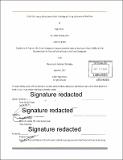Hit the deck : impacts of autonomous vehicle technology on parking and commercial real estate
Author(s)
Pitcher, Paige(Paige Marie)
Download1019902699-MIT.pdf (20.99Mb)
Alternative title
Impacts of autonomous vehicle technology on parking and commercial real estate
Other Contributors
Massachusetts Institute of Technology. Center for Real Estate. Program in Real Estate Development.
Advisor
Andrea Chegut.
Terms of use
Metadata
Show full item recordAbstract
The United States has a large supply of parking and with the adoption of autonomous vehicles, the demand for these spaces could change dramatically. Parking is among the most prevalent land uses occupying up to 31% of urban area. It is estimated that there are 3.4 to 8 parking spaces for each car in the US yielding 800 million to 2 billion spaces that could cover an area the size of West Virginia (Chester, Horvath, & Madanat, 2010). With fully autonomous vehicles expected on the consumer market by 2020, the $30 billion parking industry will experience enormous changes as cars evolve. This thesis models the effects of autonomous vehicles on the financial performance of urban parking garages. The future of parking and autonomous vehicles will be anything but smooth or certain, and this work harnesses the power of uncertainty through repeated random number simulation in financially modeling autonomous vehicles' impacts on parking garages. The results indicate that parking in the short term is a risky investment and in the longer term may not be a viable asset. As the only class of real estate explicitly built for vehicles, they have a high degree of exposure to changes created by autonomous vehicles. This is illustrated by significantly negative net present values and minimal returns of the simulation outputs. This exposure will continue to grow as the stock of parking spaces increases with minimum parking requirements for new construction. Recommendations from this research would be to limit new supply of parking to allow for greater utilization of existing stock, more beneficial use of urban land, and better use of construction and financial resources.
Description
Thesis: S.M. in Real Estate Development, Massachusetts Institute of Technology, Program in Real Estate Development in conjunction with the Center for Real Estate, 2017 Cataloged from PDF version of thesis. Includes bibliographical references (pages 54-60).
Date issued
2017Department
Massachusetts Institute of Technology. Center for Real Estate. Program in Real Estate Development; Massachusetts Institute of Technology. Center for Real EstatePublisher
Massachusetts Institute of Technology
Keywords
Center for Real Estate. Program in Real Estate Development.